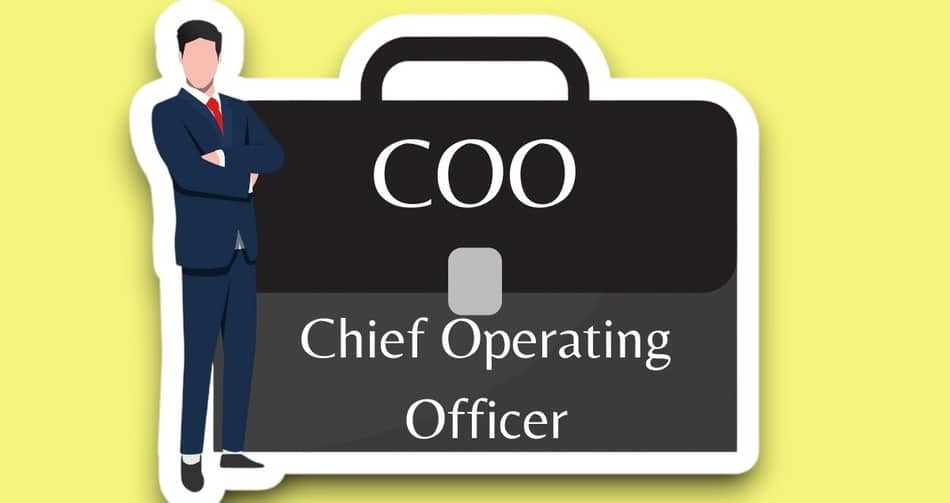Becoming COO is not as easy as ordering groceries. In fact, according to Tufts University, one should have at least 15 years of experience to reach this position. Some organizations give their employees positions based on ranking. They need more experience, education, leadership, and skills to become a COO.
This is a C-suite role where experienced and talented people play a major game.
C-suite
- Chief Executive Officer(CEO)
- Chief Financial Officer (CFO)
- Chief Information Office (CIO)
- Chief Technology Officer (CTO)
- Chief Operating Officer (COO)
- Chief Marketing Officer (CMO)
As I said, It’s not as easy as ordering groceries. You should have some experience and understand how an organization works.
Over the next few minutes, here is the list of topics that we will understand.
Table of Content
COO Full Form
The full form of COO is Chief Operating Officer.
Chief Operating Officer Meaning
The Chief Operating Officer is the one who knows how to operate an organization’s day-to-day activities. The position is to work in a variety of settings. Becoming a COO requires proper education, Experience, and Leadership skills. It’s a Senior Executive’s responsibility to oversee an organization’s day-to-day activities and implement strategies for the growth and innovation of an organization.
Chief Operating Officer Roles and Responsibilities


Chief Operating Officer Duties
Here are a few roles of the chief operating officer in an organization.
- To report to the managing directors and board members.
- Formulate and implement plans and strategies to grow the company.
- Manage and guide stakeholders.
- Identify and manage the risks associated with all the business activities.
- Oversee financial performance and budgeting for the departments.
- Interact with members of the board regularly during the monthly reporting sessions.
Chief Operating Officer Metrics and KPI
- Monitor the company’s operating results.
- Sustain the profitability of the company while ensuring growth in revenue on a yearly basis.
- Interact with customers and other stakeholders.
How to Become a Chief Operating Officer
Let’s understand how to become a Chief Operating Officer (COO) which involves different aspects.


1. Developing a strong Educational Foundation
A bachelor’s degree or similar in business administration or a related field is generally required.
Also, any certifications such as project management that match the skills will raise your capacity.
2. Learn in Board Industry Exposure
It takes years of experience across various operational and leadership roles.
Being in a position like an analyst, supply chain management, or project coordinator.
After a start into operational roles, move into middle management roles like General Manager.
3. Learn and gain industry workflow
Proficiency in Financial analysis, data-driven decision-making, and process optimization. Seeking different leadership skills is also important here, which helps, one have fluent engaging skills and people management abilities.
4. Improving leadership recognition
Leading High-impact projects helps you to collaborate with different departments and provide better results. This will improve your leadership quality.
5. Networking and User Interaction
Connect with senior leaders and maintain relationships with SMEs, industry experts, and executives explaining to you and helping you with opportunities.
6. Develop your experience in various Segments
The COO oversees all the day-to-day activities and improves the organization’s exposure. You should work in different sectors of business with industry experts in:
7. Understand Industry and Business Culture
COOs need to deploy aligned with the visions and missions of their company. Stay informed about all market requirements and loopholes in the particular industry. Build trust with board members and the CEO by demonstrating a shared vision.
8. Walking up the corporate ladder
As you progress, aim for the role that prepares you for the COO position.
VP or director roles: This position involves overseeing large teams, managing budgets, and making informed choices.
9. Be disciplined and motivated
The COO position gradually needs so much commitment, flexibility, and a result-driven mindset. This comes with years of experience. Your management abilities, flexibility, and work culture will describe how productive at work.
10. Become COO
With all the leadership skills and experience with team management, an understanding of a company’s day-to-day activities, mentoring others, and also one can apply for the position of COO in an organization.
Take the Next Step Toward Becoming a COO
Enroll in Our Program for Chief Operating Officer (COO) and Unlock Your Leadership Potential.


Chief Operating Officer Career Path
There is no particular career path to become a chief operating officer. It totally depends on your educational background, experience, and promotions. Usually, an organization looks for a candidate who has a management background and a specialization in finance, logistics, or operations. To become a COO, you should also have around 15+ years of experience in managing teams and operations. Some COOs start their careers as product managers or program managers and gradually get promoted to managerial positions like vice president or director and finally to COO. You can also start by managing a team of few; being loyal to the company could lead you to a higher position way up the ladder.
Chief Operating Officer Salary


The salary of a COO can range anywhere between INR 13 LPA and INR 100 LPA in India. While in the US, the salary can range between USD $290K to USD $790K. Here are the chief operating officer average salary figures of an individual working as a COO in a company:
| Years of Experience | Salary in India (INR) | Salary in US (USD) |
| 8 – 10 years | 45.2 LPA | $4,80,000 |
| 11 – 13 years | 51.3 LPA | $5,10,000 |
| 14 – 15 years | 65.2 LPA | $5,70,000 |
| 15+ years | 90.6 LPA | $6,00,000 |
Chief Operating Officer Job Description
Here is a chief operating officer job description for a software company:
Company Name: Michael Page
Industry: Engineering
Roles and Responsibilities:
- Developing and Executing IT Strategy
- Overseeing IT Infrastructure and Operations
- Driving Digital Transformation
- Stakeholder Collaboration
- Ensuring Compliance and Security
Get 100% Hike!
Master Most in Demand Skills Now!
Conclusion
Overall, attaining the position of COO is very tough. It requires hard work, dedication, and loyalty toward the organization, as well as skills, experience, and education. I hope this blog has given you an idea of COOs and their responsibilities, salaries, and benefits.
If you are looking for a course that can help you with becoming a COO, you can consider enrolling in Intellipaat’s Executive Post-Graduate Certification Program for Chief Operation Officer (COO) and understand how things work in the industry.